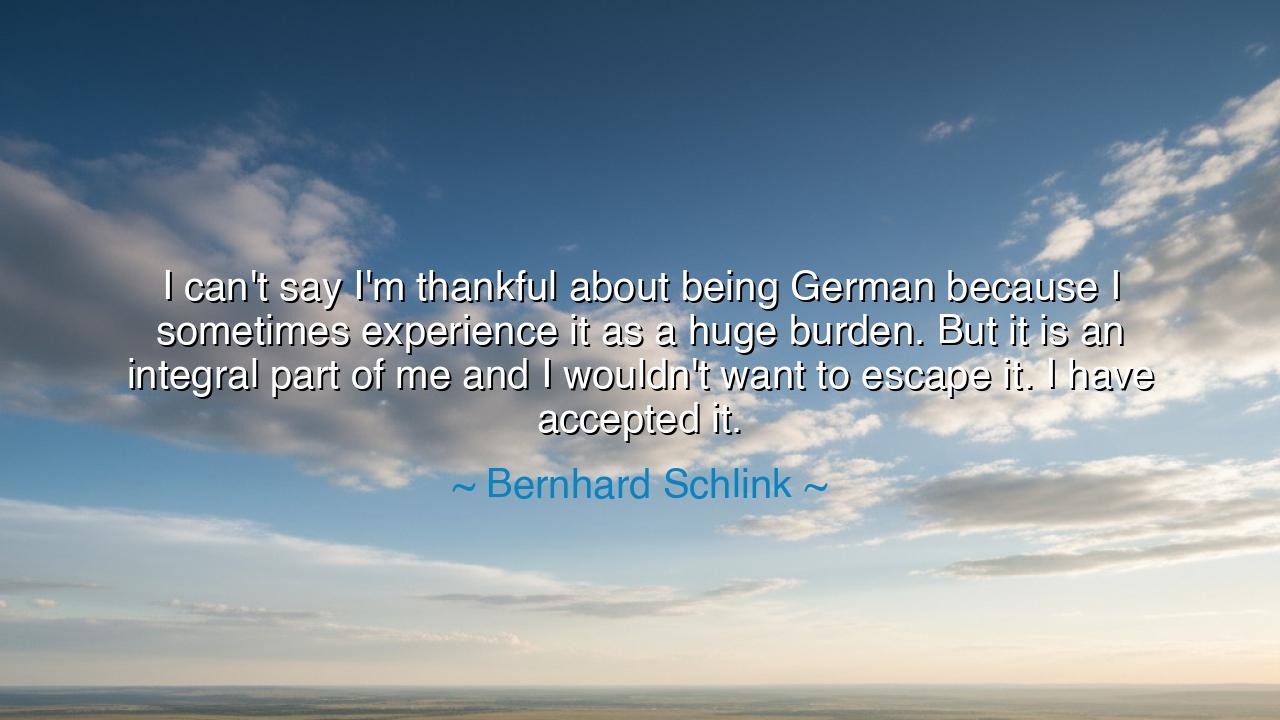
I can't say I'm thankful about being German because I sometimes
I can't say I'm thankful about being German because I sometimes experience it as a huge burden. But it is an integral part of me and I wouldn't want to escape it. I have accepted it.






When Bernhard Schlink declares, “I can’t say I’m thankful about being German because I sometimes experience it as a huge burden. But it is an integral part of me and I wouldn’t want to escape it. I have accepted it,” his words echo with the weight of history and the honesty of a soul unwilling to deny its inheritance. Here we hear not only the voice of an individual, but the cry of a people who live with the shadows of their nation’s past. His statement is not bitterness, nor is it pride—it is the deeper wisdom of acceptance, the courage to face what cannot be changed, and to live truthfully within it.
The origin of this feeling lies in the history of Germany, whose 20th century was marked by unimaginable horrors. To be German, for Schlink, is to carry the weight of that history, even generations removed. It is to know that one’s identity is bound up with both the brilliance of Goethe and Beethoven and the burden of Auschwitz and war. He admits that this heritage is at times a burden, pressing upon the spirit, shaping how others see him and how he sees himself. Yet he does not flee from it. Instead, he proclaims, “I have accepted it,” and in those words lies the strength of truth.
History gives us many mirrors of such burdens. Consider Japan after World War II, whose people carried the dual identity of a rich cultural heritage alongside the devastation wrought by imperial aggression. Many felt shame; others sought to forget. But the nation rose when it faced its past honestly, neither fleeing from it nor allowing it to define all that came after. In the same way, Schlink shows us that identity is not chosen like a garment but borne like a mantle—sometimes heavy, sometimes glorious, yet always ours.
His words also reveal a hidden heroism in acceptance. To reject or deny one’s heritage is to live in exile from the self, to fracture the soul. To accept, however, is to stand firm, to say: “This is my story, woven with both light and darkness, and I will live it whole.” In this, Schlink teaches us that thankfulness does not always mean delight. Sometimes it means acknowledging that even the burdens we did not choose are part of the soil in which our lives are rooted.
Yet there is also wisdom in his refusal to claim thankfulness outright. For to say he was thankful to be German without qualification would risk dishonoring the memory of those who suffered under that same flag. His honesty honors both the victims and the survivors, and reminds us that gratitude must be tempered by truth. His position is not pride, but humility: an acknowledgment that identity is a complex inheritance, not always a crown to wear lightly.
The lesson here is profound. Each of us is born into identities we did not choose—national, cultural, familial. Some are sources of joy; others carry wounds and burdens. But wisdom lies not in denying them, nor in being consumed by them, but in accepting them fully and seeking to live with integrity. For acceptance is the foundation upon which healing, reconciliation, and transformation are built. Without it, the soul is divided against itself.
Practical wisdom follows. Acknowledge the parts of your story that weigh heavily upon you. Do not flee from them or pretend they do not exist. Speak of them honestly, as Schlink does. Then choose to live with courage, knowing that the burden you carry can become a source of wisdom, compassion, and depth. Teach others by your honesty, and let your acceptance inspire them to accept their own complex inheritances.
Thus, in the words of Bernhard Schlink, we are reminded that to be human is to carry both glory and burden, pride and pain. We cannot escape the roots from which we grow, but we can choose to face them with honesty and humility. In acceptance lies freedom, and in truth lies the possibility of a future redeemed. Let us therefore live as he teaches—not in denial, not in false pride, but in acceptance, bearing our burdens with dignity, and transforming them into wisdom for the generations to come.






AAdministratorAdministrator
Welcome, honored guests. Please leave a comment, we will respond soon